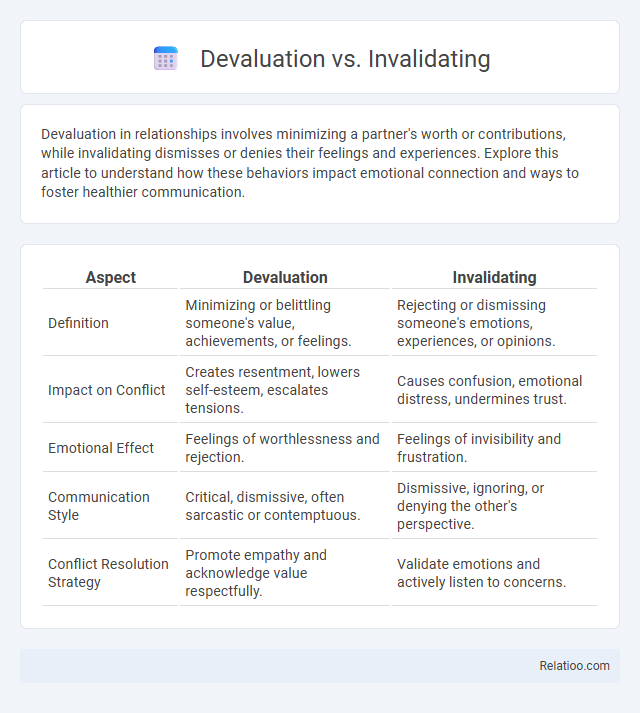Devaluation in relationships involves minimizing a partner's worth or contributions, while invalidating dismisses or denies their feelings and experiences. Explore this article to understand how these behaviors impact emotional connection and ways to foster healthier communication.
Table of Comparison
| Aspect | Devaluation | Invalidating |
|---|---|---|
| Definition | Minimizing or belittling someone's value, achievements, or feelings. | Rejecting or dismissing someone's emotions, experiences, or opinions. |
| Impact on Conflict | Creates resentment, lowers self-esteem, escalates tensions. | Causes confusion, emotional distress, undermines trust. |
| Emotional Effect | Feelings of worthlessness and rejection. | Feelings of invisibility and frustration. |
| Communication Style | Critical, dismissive, often sarcastic or contemptuous. | Dismissive, ignoring, or denying the other's perspective. |
| Conflict Resolution Strategy | Promote empathy and acknowledge value respectfully. | Validate emotions and actively listen to concerns. |
Understanding Devaluation: Definition and Context
Devaluation refers to the conscious or unconscious process of undervaluing oneself or others, often observed in narcissistic behaviors where positive qualities are diminished to protect self-esteem. Invalidating involves dismissing or rejecting another's feelings, thoughts, or experiences, leading to a breakdown in emotional communication and self-worth. Understanding devaluation is crucial in psychological contexts, as it highlights mechanisms of defense and relational dynamics that impact mental health and interpersonal relationships.
What Does Invalidating Mean?
Invalidating means dismissing or rejecting someone's feelings, thoughts, or experiences, often undermining their sense of reality or self-worth. Unlike devaluation, which involves assigning less value to a person or their qualities, invalidation specifically targets the legitimacy of their emotions or perceptions. Understanding invalidation helps you recognize harmful communication patterns and improve emotional validation in relationships.
Key Differences: Devaluation vs Invalidating
Devaluation involves diminishing the value or importance of Your achievements or qualities, often minimizing successes or positive traits. Invalidating refers to rejecting or denying Your feelings, thoughts, or experiences, undermining emotional reality rather than objective accomplishments. The key difference lies in devaluation targeting self-worth or external validation, whereas invalidation targets emotional and psychological experience.
Psychological Impact of Devaluation
Devaluation in psychology refers to the process of attributing exaggerated negative qualities to oneself or others, often resulting from defense mechanisms rooted in low self-esteem or relational conflicts. It significantly impacts mental health by fostering feelings of worthlessness, exacerbating anxiety, and impairing interpersonal relationships through distorted perceptions of self and others. Unlike invalidating, which dismisses or undermines emotional experiences, and devaluation, which reduces perceived value, psychological devaluation creates persistent emotional distress by undermining an individual's sense of identity and self-worth.
Emotional Consequences of Invalidating
Invalidating emotions disrupts mental well-being by causing feelings of worthlessness, confusion, and self-doubt. While devaluation diminishes a person's value and devaluation focuses on lowering significance, invalidation directly attacks emotional experiences, leading to increased anxiety, depression, and impaired self-esteem. Recognizing and validating emotions is crucial for healthy emotional development and resilience.
Common Examples in Everyday Life
Devaluation often appears in relationships when one dismisses a partner's achievements or emotions, while invalidating involves rejecting or minimizing another's feelings or experiences, such as telling someone "you're overreacting" during a conflict. Devaluation tends to emphasize reducing someone's worth, frequently seen in workplace criticism like disregarding an employee's input, whereas invalidation directly challenges the legitimacy of a person's thoughts or feelings, common in parent-child interactions where a child is told their fears are unfounded. Both behaviors undermine self-esteem and communication, making awareness crucial for fostering healthier interactions.
Devaluation in Relationships and Communication
Devaluation in relationships often manifests as disregarding or minimizing Your partner's feelings, achievements, or worth, leading to emotional distance and diminished trust. Unlike invalidating, which outright denies or dismisses emotions, devaluation subtly erodes self-esteem by consistently underestimating or criticizing. Understanding these distinctions is crucial for fostering healthier communication and emotional support in Your relationships.
Invalidating Behaviors: Signs and Patterns
Invalidating behaviors involve dismissing or rejecting Your emotions and experiences, often leading to feelings of confusion, self-doubt, and emotional insecurity. Common signs include consistently minimizing Your feelings, denying the validity of Your perspective, and responding with indifference or sarcasm to emotional expressions. Patterns of invalidation frequently appear in relationships where empathy and validation are lacking, which can significantly impact Your mental health and interpersonal trust.
Addressing and Healing from Devaluation
Addressing and healing from devaluation involves recognizing the emotional impact of being diminished or dismissed, which can lead to feelings of worthlessness and mistrust. Therapeutic approaches such as cognitive-behavioral therapy (CBT) and dialectical behavior therapy (DBT) help individuals reframe negative self-perceptions and build resilience against invalidation. Establishing clear boundaries and fostering self-compassion are critical steps in overcoming the long-term effects of devaluation and invalidating experiences.
Coping Strategies for Invalidating Experiences
Coping with invalidating experiences involves recognizing and challenging negative self-beliefs imposed by others, fostering self-validation, and setting healthy boundaries to protect your mental well-being. Developing assertive communication skills helps you express your feelings and needs effectively, reducing the impact of external invalidation. Engaging in mindfulness practices and seeking supportive social networks further strengthens resilience against the emotional effects of invalidation.

Infographic: Devaluation vs Invalidating
 relatioo.com
relatioo.com